
The music of Bangladesh spans a wide variety of styles. Bangladesh claims some of the most renowned singers, composers and producers in Asia. Music has served the purpose of documenting the lives of the people and was widely patronized by the rulers. It comprises a long tradition of religious and regular song-writing over a period of almost a millennium.

"Amar Sonar Bangla" is the national anthem of Bangladesh. An ode to Mother Bengal, the lyrics were written by Bengali polymath Rabindranath Tagore, while the melody is derived from Baul singer Gagan Harkara's "Ami Kothay Pabo Tare", set to Dadra tala. The modern instrumental rendition was arranged by Bangladeshi musician Samar Das.
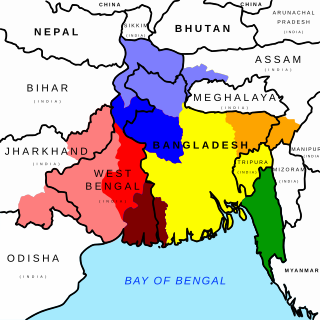
Bengali music comprises a long tradition of religious and secular song-writing over a period of almost a millennium. Composed with lyrics in the Bengali language, Bengali music spans a wide variety of styles.

Kabir SumanBengali pronunciation:[kobiɾʃumon] is an Indian singer-songwriter, musician, music director, music composer, writer, actor, politician, and former journalist.

Dilshad Yasmin Sabina, otherwise known as Sabina Yasmin is a Bangladeshi singer. She is best known as a playback singer in Bengali cinema. She has won Bangladesh National Film Award for Best Female Playback Singer a record 14 times. She has recorded more than 1,500 songs for films and more than 10,000 songs in total.

Jôdi Tor Dak Shune Keu Na Ase Tôbe Ekla Chôlo Re, commonly known as Ekla Chôlo Re, is a Bengali patriotic song written by Rabindranath Tagore in 1905.
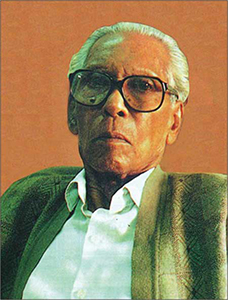
Abdul Latif was a Bangladeshi singer, musician, and lyricist. He was the initial composer of the Bengali language movement song, "Amaar Bhaiyer Rakte Rangano Ekushey February". He was awarded Ekushey Padak in 1997 and Independence Day Award in 2002 by the Government of Bangladesh.

Shahnaz Rahmatullah was a Bangladeshi singer. Her notable songs are Ekbar Jete De Na Amar Chotto Sonar Gaye, Je Chilo Drishtir Shimanay and Ek Tara Tui Desher Kotha. She was the recipient of the Ekushey Padak in 1992 and Bangladesh National Film Award for Best Female Playback Singer for the film Chhutir Phande (1990).

Kabir Bakul is a Bangladeshi lyricist and journalist. He won the Bangladesh National Film Award for Best Lyrics 6 times for the films Megher Kole Rod (2008), Swami Strir Wada (2009), Nisshash Amar Tumi (2010), Purno Doirgho Prem Kahini (2013), Nayok (2018) and Bishwoshundori (2020). As of 2013, he has written about 5000 songs.
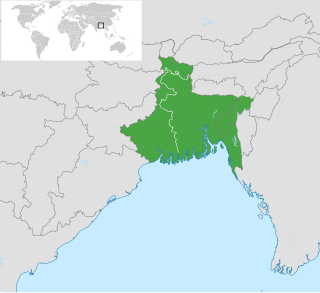
Baṅgamātā, Bangla Maa, Mother Bengal or simply বাংলা/ Bangla, is a personification of Bengal conceived during the Bengali Renaissance and later adopted by the Bengali nationalists. In Bengali poetry, literature, culture and patriotic songs, the Mother Bengal represents not only biological motherness but its attributed characteristics as well – protection, never ending love, consolation, care, the beginning and the end of life.
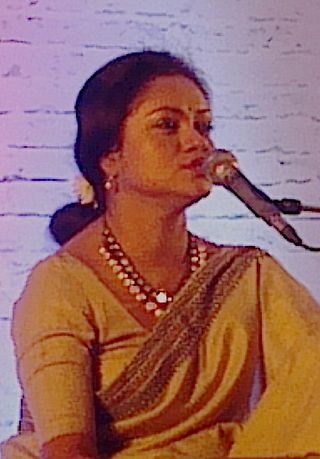
Adity Mohsin is a Bangladeshi Rabindra Sangeet singer.

A K M Shafiqur Rahman Tuhin is a Bangladeshi lyricist, music director and singer. As of 2012, he wrote about 1,000 songs. He earned the Bangladesh National Film Award for Best Lyrics for the song Choto Choto Golpo in the film Projapoti (2011) and Citycell-Channel-I Music Award in 2006, 2011 and 2013.

Gazi Mazharul Anwar was a Bangladeshi film director, producer, lyricist, screenwriter and music director. He earned the Bangladesh National Film Award for Best Lyricist a record seven times for the films Tit for Tat (1992), Ajante (1996), Churiwala (2001), Lal Dariya (2002), Kokhono Megh Kokhono Brishti (2003), Meyeti Ekhon Kothay Jabe (2016) and Joiboti Konyar Mon (2021). He worked as a lyricist in the "Swadhin Bangla Betar Kendra". He was awarded Ekushey Padak in 2002 and Independence Day Award in 2021 by the government of Bangladesh. He has penned lyrics for 267 films.
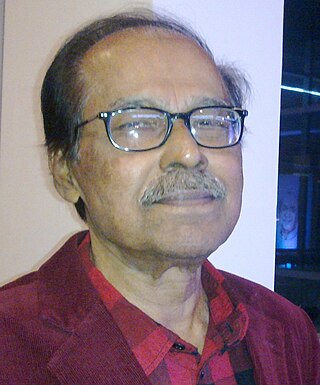
Syed Abdul Hadi is a Bangladeshi singer. He won the Bangladesh National Film Award for Best Male Playback Singer five times for his playback performance in the films Golapi Ekhon Traine (1979), Sundori (1979), Koshai (1980), Goriber Bou (1990) and Khoma (1992). He is the recipient of Ekushey Padak in 2000.
Mahmudun Nabi was a Bangladeshi playback singer. He was awarded Bangladesh National Film Award for Best Male Playback Singer for his performance in the film The Rain (1976).
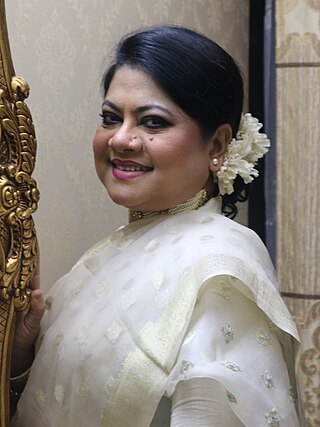
Kanak Chapa is a Bangladeshi singer. She received the Bangladesh National Film Award for Best Female Playback Singer three times, for her performance in the films Love Story (1995), Premer Taj Mahal (2001) and Ek Takar Bou (2008). She published her autobiography Sthobir Jajabor in 2011 and a poetry book Mukhomukhi Joddha in 2012.
"O Amar Desher Mati" is a Bengali patriotic song written by Rabindranath Tagore. It was written against the Partition of Bengal in 1905. Indira Debi Chowdhurani provided the notation of the song. This song belongs to the "Shawdesh" (patriotic) group of Rabindra Sangeet. It was composed in Pilu-Baul Raga and Dadra Taal.

"Jodi Raat Pohale Shona Jeto" is a song from the 1991 Bangladeshi music album named Jonotar Nouka. The lyricist of this modern music was Hasan Motiur Rahman. Moloy Kumar Ganguly composed sang originally this song to the tune with music arrangement of Almas Ali. The song is considered to be the most popular song about Sheikh Mujibur Rahman. The song was released under label of Chenasur along with other songs from the audio album.
"I Am Blessed to Be Born" is a Bengali patriotic song composed in 1970 by Azad Rahman with lyrics by Noyeem Gahar. This song is in the genre “Jagorner Gaan”(lit.“Songs of Awekaning”) which was prevalent during the Bangladesh Liberation war. This song Personifies Bengal as a Mother; And shows themes of nationalism and patriotism. After Bangladesh’s independence this song gains popularity with the singing of Sabina Yasmin.
"Prothom Bangladesh" is a patriotic song by Shahnaz Rahmatullah. Moniruzzaman Monir wrote and Alauddin Ali composed the song. The song was first broadcast in a TV program on Bangladesh Television in the late 1970s.














